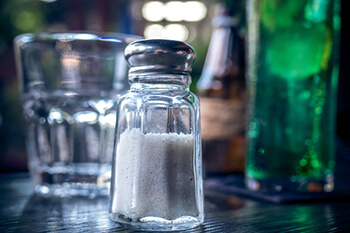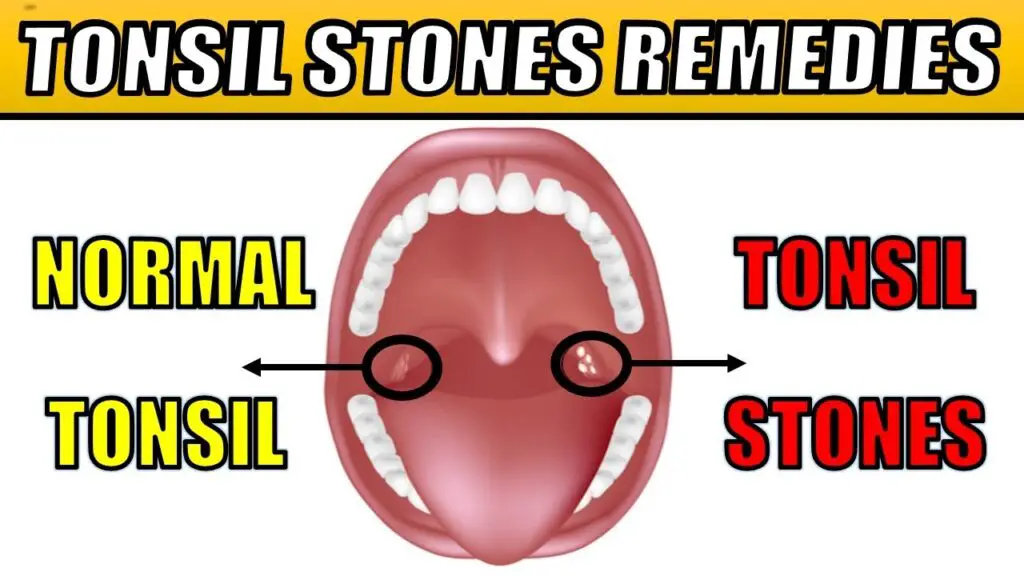Tonsil Stones
Tonsil stones, also called tonsilloliths, are hard debris formed from bacteria, food, and debris that get stuck on the tonsil. They tend to be painful and have a foul odor.
The tonsils, which are located at the back of your throat and are a part of the immune system, have an important function. Tonsils trap germs that have been inhaled. Antibodies within them kill these germs and prevent infections.
Tonsil stones are typically visible, and therefore can be diagnosed quite easily. However, in circumstances where tonsil stones are smaller or embedded deep within the tonsil, an MRI or CAT scan may be necessary to make an accurate diagnosis.
The Cause of Tonsil Stones
Tonsil stones are caused by a build-up of bacteria that get stuck within the tonsils. As tonsils are soft tissue, they contain crevices and crypts in which bacteria may get trapped, causing tonsil stones or tonsil infection.
Tonsil stones are formed when the bacteria and debris that is trapped hardens. This tends to happen for people who experience regular cases of tonsilitis or experience long cases of inflammation in the tonsils. You may also be at risk of developing tonsil stones if you have large tonsils, have bad oral hygiene, or have chronic sinus infections.
Symptoms of Tonsil Stones
Those with tonsil stones experience a variety of symptoms. Foul-smelling breath, a white or yellow growth on the tonsil, a hard time or pain when swallowing, swollen tonsils, cough and a feeling as though something is blocking the throat are all common symptoms of tonsil stones. There may be a variation of these symptoms, but the stones are typically visible.
These symptoms can cause discomfort and pain, so be sure to check with your doctor if you're experiencing any of the above before taking at-home action. Tonsil stones may be in conjunction with tonsillitis or on its own, so it is important to be diagnosed by a healthcare professional.
Some smaller tonsil stones may not present with any symptoms, but will still be visible. People with recurring tonsil infections are more at risk for tonsil stones.
How to Get Rid of Tonsil Stones
Natural Remedies to Remove Tonsil Stones
There are many remedies to get rid of tonsil stones at home. These can be used on smaller tonsil stones that don't need medical intervention.
Garlic


Thanks to its antifungal and antibacterial properties, consuming more garlic in your diet may help with the prevention and treatment of small tonsil stones. Chewing garlic helps release its allicin. The allicin contains important anti-bacterial properties that help with tonsil stones. Wait fifteen to twenty minutes before brushing your teeth to get rid of any strong garlic smells if desired.
Coughing


Aggressive or strong coughing done on purpose may be useful to dislodge tonsil stones that are present in the throat. This works for smaller tonsil stones that are not lodged deep in the throat. Cough as hard as possible repeatedly with small breaks in between to dislodge the stones. You may use other remedies in between, such as gargling with salt water or manual dislodgement, to help the process.
Gargling with Salt Water


Using salty water to gargle may help with bacteria that are present in the mouth. It may also help remove and treat tonsil stones. Salt water helps decrease the amount of plaque found within the mouth and is an easy and natural remedy. The use of salty water should also help with the odor caused by tonsil stones. Dissolve a teaspoon of salt in a glass of water and gargle for fifteen seconds at a time. Spit out the water once finished.
Apple Cider Vinegar


Vinegar and apple cider vinegar can be used to help break down the tonsil stone itself. By gargling with a vinegar mixture composed of one tablespoon of vinegar and one cup of water, you can dissolve the stones. Your tonsil stones may also become dislodged by the act of gargling mixed with the dissolving properties of vinegar.
Manual Removal
Manual removal may be used to get rid of tonsil stones. This can be done with a clean cotton swab or finger and pushing on the tonsil to dislodge the stone. Manual removal doesn't feel very pleasant, so it's not for everyone. Be sure to gargle with salt water and vinegar afterward to rid the area of bacteria.
Essential Oils
Essential oils such as lavender and lemongrass contain certain antibacterial and anti-inflammatory properties. These may help dislodge tonsil stones. Place one or two drops of essential oil on a toothbrush and gently brush the stone. Discard the toothbrush afterward, as it may contain bad bacteria.
Oil Pulling
Oil pulling is used to improve oral hygiene. It can help to remove bacteria that cause tonsil stones and prevent tonsil stones from growing further. To oil pull, take a tablespoon of coconut oil and place it in your mouth. Swish the oil for five to ten minutes, then spit it out. You can follow this with a salt water gargle.
Oil pulling may reduce inflammation in the mouth, reduce bad breath, reduce the risk of gum disease, and prevent cavities.
Other Tonsil Stone Treatments
Unfortunately, at-home remedies may not work on larger tonsil stones or ones that are deeply lodged within crypts of the tonsils. In this case, you may have to seek medical treatment from a healthcare professional.
Tonsil Stone Removal via Cryptolysis
Cryptolysis is the use of a laser in a medical environment to remove the crypts on the tonsils that cause bacteria to become trapped. Using cryptolysis, the laser smooths the tonsil so that there's less of a chance for the development of tonsil stones. It also decreases the risk of tonsillitis.


Tonsillectomy
A tonsillectomy may be recommended for patients who are frequently experiencing tonsillitis and tonsil stones. Frequent infection requires the tonsils to be removed. This is done via surgery, and can come with health complications. It's important to talk to your health care provider about possible non-invasive procedures before opting for a tonsillectomy.
Tonsillectomies are considered a major surgery and therefore present their own risks. Swelling, bleeding and potential allergic reactions to medications provided are among some of the risks involved in the surgery. Recovering from a tonsillectomy, you may experience pain in the neck and ears.
While having your tonsils removed may seem like an ideal solution, there are many other treatment options available that can be safer.
Antibiotics


Oftentimes, tonsil stones are caused by excess bacteria. A healthcare professional may prescribe antibiotics to treat the bad bacteria that may be causing infections.
For people with frequent cases of tonsillitis or strep throat, this may be an ideal option before pursuing more serious and invasive methods of treatment. Antibiotics come with their own side effects, however. In some cases, they can cause nausea and loss of appetite. You should also be careful to not take too many antibiotics, as you may build a resistance to them over time.
Preventing Tonsil Stones
Tonsil stones can be prevented with good oral hygiene. It is important to practice brushing your teeth for at least two minutes every morning and evening. You can also improve oral hygiene by flossing regularly, making sure to get in between the gum line. Doing this will help prevent bacteria from getting stuck.
If tonsil stones are a persistent issue, you may also want to gargle with salty water or vinegar after meals to remove any remaining debris or bacteria that may be lingering in the mouth.
Gargling with a mouth wash that doesn't contain alcohol is also a great solution for tonsil stones. Be sure to use mouth wash thirty minutes after brushing the teeth to ensure that the fluoride from your toothpaste is not stripped from your teeth.
Waterpiks may be used instead of floss to help remove bacteria from your mouth. Waterpiks aim a stream of water at the teeth to dislodge food. Using a waterpik may help prevent gum disease and prevent bleeding gums.
Tonsil removal may be recommended if tonsil stones are frequent. It is important to discuss this with your health care provider as it involves major surgery with a recovery time, and may have its own side effects.
Conclusion
You can get rid of tonsil stones with many at-home treatments. The most effective treatments are those that rid the mouth and throat of bad bacteria that may be causing infection or the tonsil stones themselves. Gargling with salt water or using apple cider vinegar as well as maintaining good oral hygiene is the best way to prevent and manage tonsil stones.
Most tonsil stones can be removed manually, but if they're recurrent, you should seek the advice of a healthcare professional.

